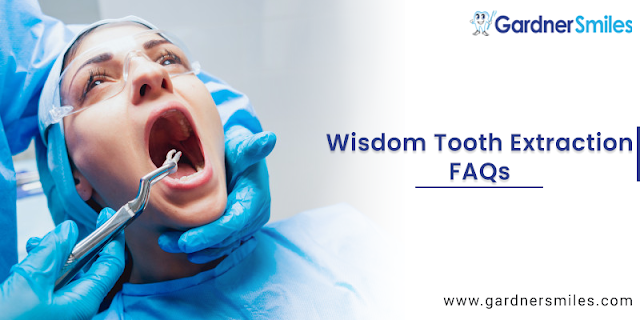Wisdom Tooth Extraction FAQs
Wisdom teeth are third molars that erupt between the age of 18-25 which is called the age of wisdom. At some point between late teenage and early adulthood, 95% percent of people develop wisdom teeth. It is common that some people might not develop all four wisdom teeth and might have just one or two wisdom teeth.
In this blog, we will answer some of the most frequently asked questions regarding wisdom tooth extraction. So, before you go for wisdom tooth removal in Gardner, MA, we will share some common knowledge regarding the same with you so that you are better informed and better prepared.
Signs your wisdom tooth needs to be extracted
Some of the most common signs of wisdom tooth extraction are:
- Tooth pain
- Redness and inflammation in gums
- Jaw pain
- Impacted teeth
- Occasional bleeding and swelling
- Oral infections around the wisdom teeth site
- Difficulty in cleaning the area behind second molars
Why do wisdom teeth need to be extracted?
Wisdom teeth do not always have to be extracted. If the upper/lower jaw does not have proper space to fit in, it can cause difficulties in cleaning the mouth and further infection. In cases when the condition is severe and your oral health is at higher risk, your dentist will advise you to go for extraction.
What is an impacted wisdom tooth?
A wisdom tooth is impacted when the third molar at the back of your mouth does not have enough space to erupt normally. This could lead to dental complications, leading to severe discomfort and a possibility of more extensive dental interruption.
In such cases, you shall immediately consult your dentist to know if extraction could alleviate your discomfort and pain.
Will the extraction process be painful?
The patient will be sedated during the procedure for a better experience. This allows the patient to not feel any pain during the procedure and have limited memory of the process. Apart from the optional anesthesia, your dentist will numb your gums by applying local anesthesia during the procedure.
Once the effect of anesthesia wears off, you might experience pain and will feel uncomfortable. But your dentist will give you instructions to reduce swelling and pain while you are recovering at home along with pain medications.
Will I have stitches?
There likely will be stitches at the spot from where the wisdom tooth is removed. Your dentist will guide you on how to care for the stitches and incisions sites. Stitches, however, will dissolve within 1 to 2 days.
What are dry sockets?
The exposed bone in the extraction spot are dry sockets which are usually painful. They are seen for around 3 to 5 days post-operation. To prevent this, your dentist tries to keep the blood clot in that extraction socket for long. This means you have to strictly avoid spitting, smoking, and straws.
What is the recovery period?
The main recovery period is the first 3 to 5 days. However, it will take 15 days to fully recover. During this period, the patient might experience swelling in cheeks and gums and there may be some discomfort which will lessen gradually. Follow the care instructions that your dentist has given you for the recovery period.
What should I eat after the removal?
You should consume only soft food items after the extraction.
Recommended food includes apple juice, blended soups and broths, scrambled eggs, mashed bananas and potatoes, other soft fruits, smoothies, oatmeal, avocado, etc.
Avoid dairy products, crunchy and crumbly foods, spicy foods, sharp foods, and alcohol.
If you have any further queries about wisdom tooth extraction in Gardner, MA, feel free to book an extensive consultation with our expert.

.png)

Comments
Post a Comment